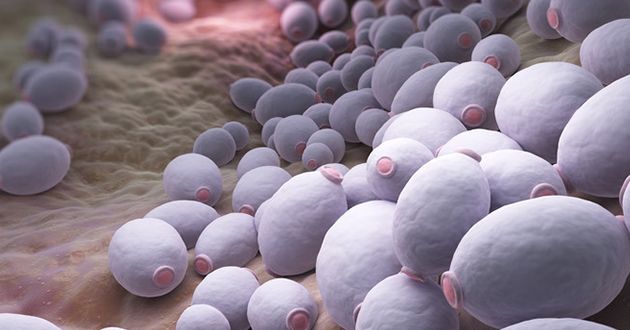Candida is a fungus, actually a form of a yeast, and a very small amount of this fungus normally lives in the human body (mouth and intestines). What is its main job? Candida fungus helps with digestion and absorption of nutrients.
But when overproduced, i.e. when candida is multiplied, it leads to health problems. So it can break down the intestinal wall and penetrate the bloodstream – releasing toxic byproducts into your body and causing bowel syndrome and candidiasis.
This condition is called candida infection. Excessive candida in the body can actually lead to many different health problems, from digestive to depression. On the other hand, candida infection can affect almost all parts of the body.
What is the cause of candida overproduction?
The good news is that healthy bacteria in your gut usually keep candida levels under control. However, several factors can cause the candida population to grow beyond control:
- Excessive consumption of foods rich in carbohydrates and refined sugars
- Drinking lots of alcohol
- Taking oral contraceptives
- Nutrition rich in beneficial fermented foods (such as Kombucha, sauerkraut and pickles)
- Life under excessively stressful circumstances
- Taking antibiotics that have destroyed too many of our friendly bacteria
- Immunity drop for any reason.
What are the common symptoms of candida?
As we said before, candida can affect almost every part of the body. Therefore, candida symptoms can be numerous depending on which part of the body is affected.
- Skin and nail fungal infections are common, such as athletic foot or onychomycosis (nail fungus).
- Unexplained feeling of tiredness and exhaustion, or chronic fatigue and fibromyalgia are common symptoms of candida.
- Digestive problems such as bloating, constipation or diarrhea.
- Numerous autoimmune diseases such as: Hashimoto’s thyroiditis, rheumatoid arthritis, ulcerative colitis, lupus, psoriasis, scleroderma or multiple sclerosis.
- Difficulty of concentration, poor memory, lack of focus, ADD, ADHD, and brain fog.
- Skin problems such as eczema, psoriasis, rashes.
- Irritability, mood swings, anxiety or depression.
- Vaginal infections, urinary tract infections, rectal itching or vaginal itching.
- Serious allergies or itchy ears.
- Strong desire to consume sugars and other carbohydrates.
Diagnosis
Blood test
You should first check the levels of antibodies called IgG, IgA and IgM. This can easily be done in most medical labs, and high levels can indicate you have candida infection.
However, it has been observed in practice that these tests can often be negative even when the stool or urine test is positive.
Stool testing
The lab will check the candidate in the colon or lower intestine and can usually determine the type of yeast – as well as which treatment will be most effective.
How is candida treated?
In order to treat it successfully, you have three things to do: stop the overgrowth of this type of fungus, “build up” friendly bacteria, and cure the intestines so that candida can no longer enter the bloodstream.
Step One: Eliminate candida overgrowth, which generally requires switching to a low carb diet and avoiding / eliminating sugar.
Sugar is what feeds the candida. Start by eliminating sugar in all its simple forms – such as sweets, desserts, alcohol, and flour. At the same time, reduce to just 1 cup a day of more complex carbohydrates, such as cereals, beans, fruits, breads, pastes and potatoes. This will help prevent candida growth and eventually cause it to disappear.
We also recommend not take too many fermented foods. This is because, although they are commonly known to help nourish good bacteria, most people do not realize that candida fungus feeds in exactly the same way.
In addition to this anti-candida diet, it is recommended that patients use fungal medicines such as Diflucan or Nistatin for at least one month.
Natural candida treatment
If you are more for natural healing methods, you can take the caprylic acid supplement. Caprylic acid, which comes from coconut oil, basically “punches holes” in the candida cell wall, causing it to disappear.
Then, you need to ‘rebuild’ the good bacteria that usually keep the candida population under control. Regular uptake of 25 to 100 billion units of probiotics should help reduce candida levels and restore levels of good bacteria. You can look for such probiotics at pharmacies.
You should also be careful with probiotics – read this text Click here
Finally, heal your stomach completely. Removing inflammatory foods that can harm your gastrointestinal tract – and introducing foods that help you – will prevent candida from making a mess in your body, thus improving your overall health.
If you think you have a candida infection you can schedule an expert consultation by calling the Atlas General Hospital phone number: +381 11 785 88 88
